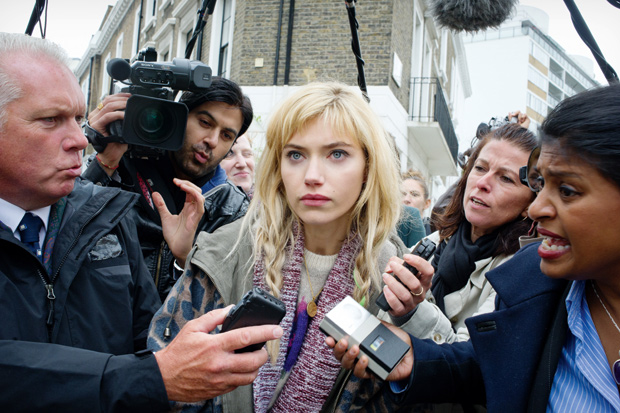A Long Way Down is about four would-be suicides who meet for the first time on the top of a tall London building, intending to jump, but instead of jumping they decide to hang around and annoy the hell out of us for the next 90 minutes. Had I known what I know now, and had I also been on top of that tall building, I might well have given them all a hefty nudge.
Based on the Nick Hornby novel, which, in itself, may not be the most successful of Hornby’s novels, it opens on New Year’s Eve on top of that building as our suicidal quartet truck up. Firstly, it is Pierce Brosnan as Martin Sharp, a former breakfast television star whose fling with a 15-year-old — ‘I thought she was 25!’ — led to a spell in prison and the end of his career and marriage. This is why he is sad. Although why we are meant to feel for him, as we are, rather than for the 15-year-old or his ex-wife or his children, is anyone’s guess. Anyway, let’s crack on, as I don’t wish to waste more time on this than I already have. Really.
So there is Martin, but also Imogen Poots as Jess, the daughter of a politician. She is meant to be deeply messed up but comes across as such a spoiled, entitled idiot and so irritatingly ‘kooky’ you will want to nudge her off the ledge first. Also, we have Aaron Paul as J.J, a failed musician who now delivers pizzas and claims to have brain cancer, and Toni Collette as Maureen. Maureen is the single mother of a severely disabled son and is obviously a middle-aged frump of the kind who has never properly lived because she is only ever seen in a cardigan, which is always a lazy film’s shorthand for the middle-aged frump who has never properly lived, even though it makes no sense whatsoever. I, for example, own many cardis, and am extremely with it.
The director, Pascal Chaumeil, steers all this towards comedy (I think), and whereas a feel-good suicide film seems unlikely, this might have worked if the subject matter had been handled with 1) insight and 2) sensitivity, but as neither quality is present, the result is not just horribly glib, failing to capture a single true emotion, but may even constitute an insult to anyone who has truly experienced mental pain. To get you as close as I can to the tone, I would ask you to imagine Richard Curtis had made a film about the holocaust, which of course he wouldn’t, because he knows where he is at. But if he did, its approach to suffering would feel just like this. And feel as inappropriate as this. And as mistaken. Also, as unwise.
The plot, such as it is, has the characters make a pact to give life another chance, at least until Valentine’s Day, and what then follows as they traipse about Being There For Each Other just isn’t believable, not even for a fraction of a nanosecond, or a fraction of a fraction of a nanosecond, as it bears absolutely no relation to how real people might behave or talk, or have behaved and talked, since the very beginning of time. When Maureen arrives on the rooftop and finds Martin about to jump, she politely asks: ‘Are you going to be long?’ I’m not saying films have to be true to life, but they have to be true to an idea of life, at least. At various junctures the four become media celebrities, which they wouldn’t, holiday together in Spain (who paid?), are offered no psychiatric help, get into a fight so they can all emerge with at least one comedy black eye…seriously, I could go on and on…has Martin driving around in a spanking new 4×4, which is weird, as he keeps repeating he is broke, and has Jess hating her dad, because he’s such a phony, whereas, in fact, he seems rather decent. And long-suffering. Poor chap.
So nothing adds up, including the characters, who are so poorly written, and such clichés, one feels no sympathy for them whatsoever — jump! Jump! — as they journey towards a conclusion that is as unearned as it is mawkishly contrived. I only felt sorry for the cast, who did their best, but could not surmount the source material, not even Collette, who replayed Muriel from Muriel‘s Wedding, but in a cardi. So that’s A Long Way Down, which may have height, but has no depth, and now I’m out of here. Phew.
Got something to add? Join the discussion and comment below.
Get 10 issues for just $10
Subscribe to The Spectator Australia today for the next 10 magazine issues, plus full online access, for just $10.
You might disagree with half of it, but you’ll enjoy reading all of it. Try your first month for free, then just $2 a week for the remainder of your first year.














Comments
Don't miss out
Join the conversation with other Spectator Australia readers. Subscribe to leave a comment.
SUBSCRIBEAlready a subscriber? Log in